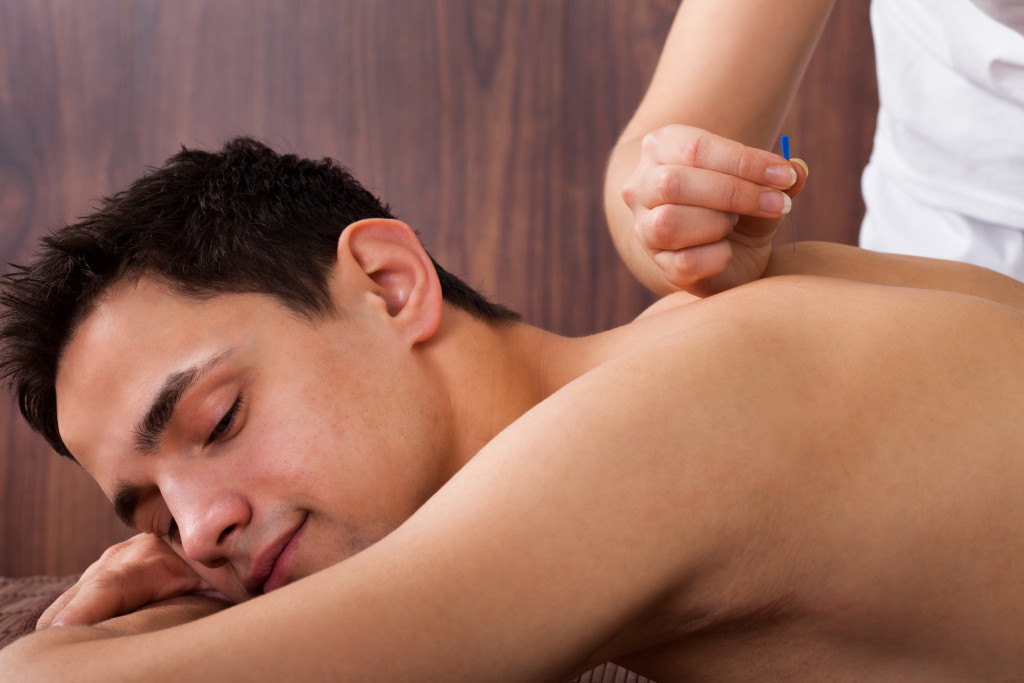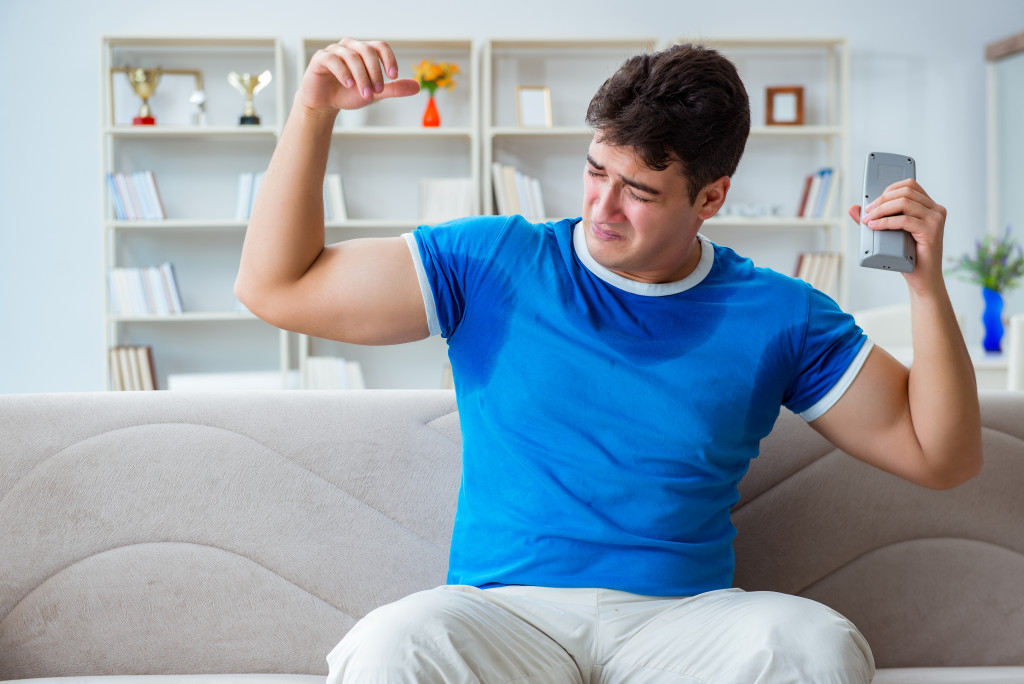- Excessive sweating, or hyperhidrosis, is a common and distressing medical condition that can
- cause social anxiety and negative self-image.
- Treatments range from prescription-strength antiperspirants to Botox injections and iontophoresis therapy.
- Lifestyle changes like wearing breathable fabrics, managing stress, practicing good hygiene, and using absorbent powders can help manage symptoms.
- Medications such as anticholinergics and clonidine can also be prescribed to reduce sweating.
- Alternative natural remedies such as aromatherapy, acupuncture, and herbal medicines may also provide relief from excessive sweating.
Everyone sweats, but excessive sweating, also known as hyperhidrosis, can be a significant and distressing problem. It causes discomfort and embarrassment, interfering with everyday activities and negatively impacting self-confidence. However, several treatments and strategies are available to manage excessive sweating effectively.
Excessive sweating affects millions worldwide, impacting their social, professional, and personal lives. It can lead to anxiety, depression, and a negative self-image, affecting relationships, job performance, and overall well-being.
People with excessive sweating may avoid social situations, feel self-conscious, and endure discomfort or embarrassment.
Various factors, including heat, stress, anxiety, certain foods, and medical conditions, can trigger sweating. It primarily affects the underarms, palms, and soles of the feet but can also affect other areas of the body.
Managing excessive sweating can significantly improve comfort and confidence, helping people to enjoy their everyday lives without worrying about sweat stains, odors, or discomfort.
Medical Approaches for Excessive Sweating
If you suffer from excessive sweating, it’s time to seek medical attention. Your doctor can rule out underlying conditions and discuss treatment options with you. A wide range of treatments are available, and here are some:
Prescription-Strength Antiperspirants
Prescription-strength antiperspirants formulated with aluminum chloride hexahydrate can effectively control hyperhidrosis. They block the sweat ducts and reduce sweating by up to 80 to 90%.
They are best applied at night before bed when sweating is less likely to occur and are typically advised to be left on for eight hours. These antiperspirants can present mild to severe side effects, including skin irritation, redness, and itching.
Medications To Reduce Sweating
Various medications can help manage excessive sweating. Anticholinergics, such as glycopyrrolate, block acetylcholine, a neurotransmitter that triggers sweat production.
Clonidine is another medication that can reduce sweating by decreasing sympathetic nerve activity. Discussing with a doctor before taking medications is essential because they can have side effects, and everyone responds differently.
Botox Treatment
Botox is an FDA-approved treatment for hyperhidrosis. Botox treatment offers an effective and reliable solution for managing hyperhidrosis, providing much-needed relief from excessive sweating.
By blocking the signals that trigger sweat production, Botox injections can significantly reduce sweating in targeted areas and improve the overall quality of life for individuals struggling with this condition.
With its proven track record and long-lasting results, Botox treatment remains a popular choice for those seeking an effective solution to manage hyperhidrosis.
Iontophoresis Treatment
Iontophoresis is a procedure that utilizes electrical stimulation to reduce sweating. It involves placing the affected body part, usually the hands or feet, into a shallow water tray and delivering a low electrical current. The current stimulates the sweat glands to reduce their activity, resulting in less sweat.
This treatment can be done at home with a purchased device or in a specialized clinic with a more advanced machine such as Hidrex. Although the procedure is painless, it is usually recommended to be done 2 to 3 times a week, as the effects may not last long.
Lifestyle and Home Remedies
One of the first steps in managing excessive sweating is lifestyle changes. These are some effective strategies to manage excessive sweating and improve quality of life:
Choosing Breathable Fabrics and Clothing
Another effective strategy to control sweating is selecting breathable fabrics such as cotton, linen, and bamboo that allow air to circulate and prevent moisture build-up.
Tight clothing, especially synthetic materials, can trap heat and perspiration, aggravating hyperhidrosis. Loose-fitting outfits and layers that can be removed easily are recommended, especially in hot and humid weather.
Managing Stress and Anxiety
Stress and anxiety are common triggers of excessive sweating, so managing these emotional factors can significantly reduce perspiration.
Meditation, deep breathing, and yoga can calm the mind and alleviate stress and anxiety. Finding time for relaxation and hobbies that bring joy and fulfillment can also enhance overall well-being and reduce sweating.
Practicing Good Hygiene and Skin Care
Maintaining good hygiene and skin care can help prevent bacterial growth and unpleasant odor from excessive sweating.
Taking daily showers or baths with mild soap, using an antiperspirant, and changing clothes frequently can prevent sweat from accumulating and reduce the chances of skin irritation. It’s also important to moisturize the skin regularly, especially in areas prone to sweating.
Using Absorbent Powders or Pads
Another option to control sweating is using over-the-counter absorbent powders or pads that can be applied to areas of the body that sweat excessively.
These products can absorb sweat and prevent moisture build-up, reducing the risk of skin irritation and odor. It’s important to choose gentle and safe products and not apply them to broken skin or open wounds.

Alternative and Natural Remedies
In some cases, alternative and natural remedies can help control excessive sweating, especially when conventional treatments are ineffective or have side effects. Here are some options to consider:
- Herbal Remedies and Supplements: There are some herbs and supplements that are believed to reduce sweat, such as sage, St. John’s Wort, and magnesium.
- Aromatherapy and Essential Oils: Essential oils such as lavender, peppermint, and tea tree oil have cooling and soothing properties that can control sweating and reduce stress.
- Acupuncture and Acupressure: These ancient practices involve stimulating specific pressure points in the body to balance energy flow and alleviate symptoms. Some studies have shown that acupuncture and acupressure can reduce sweating.
- Homeopathic Remedies: Homeopathy is a natural approach to healing that uses highly diluted substances derived from plants, minerals, or animals to stimulate the body’s self-healing mechanisms.

Excessive sweating is a distressing condition that can negatively affect people’s lives, but treatments and strategies are available to manage it. Medical approaches such as prescription-strength antiperspirants, Botox injections, iontophoresis therapy, medications like anticholinergics, and clonidine can all be used to reduce sweating.
Additionally, lifestyle changes like wearing breathable fabrics, managing stress levels, practicing good hygiene, and using absorbent powders may also provide relief from excessive perspiration. Alternative natural remedies such as aromatherapy, acupuncture, or herbal medicines could offer additional support for those struggling with hyperhidrosis.
With the right treatment plan tailored to individual needs—medical or alternative—individuals affected by this condition will have more confidence in their daily activities without worrying about sweat stains or odors.

